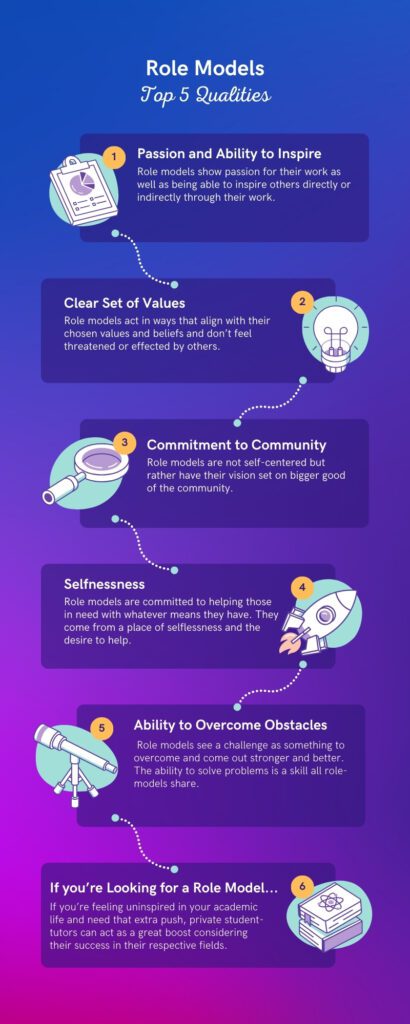The Importance of Role Models in Education
In today’s society, it is crucial for young people to have positive role models in their lives. Research studies have shown that adolescents with access to positive role models have higher self-esteem, better academic performance, and less likelihood of engaging in risky behaviours. Unfortunately, many children and adolescents do not have positive role models to look up to. In this article, we will explore the importance of positive role models for youth, what characteristics make a good role model, and how parents, educators, and community members can help young people access positive role models in their lives.

The Importance of Role Models in Education
Role models for students play a crucial role in shaping the educational experience. They provide positive examples and inspire young people to strive for their goals. By emulating the behaviour and habits of role models, students can develop a strong work ethic and achieve academic success. Here are just a few reasons why having a role model is important:
- Shapes Work Ethic and Brings Academic Success – By observing and emulating the behaviours, habits, and attitudes of their role models, students can cultivate a strong work ethic that is conducive to academic achievement.
- Motivation to Strive for Goals – Role models serve as a source of inspiration, encouraging students to persevere and strive for their aspirations.
- Eliminates any self-doubt – Being young and inexperienced brings its own set of issues like self-doubt and low self-esteem, youth often feels overwhelmed by the expectations set by other people and themselves, role models can act as an example that there is light at the end of the tunnel that is younghood.
Key Figures That Act as Role-models
Parents, teachers, and other significant adults often act as the primary role models for students, exemplifying desirable behaviours, work ethics, and values.
Teachers, in particular, can inspire students by demonstrating commitment, hard work, and dedication to their subjects, setting a standard for success and perseverance. They can also help students navigate challenges in the modern educational system, such as shrinking break times in UK schools and their impact on social development and learning.
The Role of Student Tutors as Mentors
Beyond mere academic tutoring, student mentors can offer invaluable support in personal and emotional aspects, especially crucial for students lacking positive home role models or facing personal challenges affecting their studies.

Aran A.
Maths | English Tutor
Student at UNIVERSITY OF CAMBRIDGE
£20 Per session
Book Free TrialStudent tutors can serve as mentors, providing not just academic support but also personal and emotional guidance. This is especially important for students who may not have positive role models at home or who may struggle with personal challenges that impact their academic performance.
The Characteristics of Good Role Models in Education

When it comes to education, having a good role model for younger students can make a significant difference in a student’s academic and personal development. But what exactly makes a good role model in education? Let’s take a closer look at some of the key characteristics:
✅ Achievement and Hard Work.
“We tend to become like those we admire”
Thomas Monson
A good role model in education should be someone who has achieved success through hard work and dedication, and who can inspire students to do the same.
✅ Passion for Learning.
A good role model should have a genuine love for learning and should be able to convey that enthusiasm to their students. This can help students see the value of education and motivate them to pursue their academic goals. Great educational role models understand that students may have different learning style preferences and can adapt their approach to accommodate various needs while still maintaining their passion for the subject matter.
✅ Professionalism and Responsibility.
Good role models should demonstrate professionalism and responsibility in their work, which are essential for success in any field. They should also model good behaviour and ethics, and hold themselves to high standards.
✅ Positive Attitude and Encouragement.
A good role model should have a positive attitude towards their students and their work and should encourage and support students in their academic and personal pursuits. This can help build confidence and self-esteem in students, and create a supportive learning environment.
In fact, research supports this. A study published in the “Journal of Educational Psychology” found that teachers’ positive attitudes and encouragement can significantly influence students’ engagement and achievement. The study highlighted that when teachers show enthusiasm and provide positive feedback, it can enhance students’ intrinsic motivation, leading them to engage more deeply with the subject matter. Additionally, a positive and supportive approach from educators helps to create a safe learning environment where students feel valued and confident to explore new ideas and take on challenges.
✅ Knowledge and Expertise.
Good role models should have a strong understanding of their subject matter and be able to convey that knowledge effectively to students. They should also be open to learning from their students and willing to adapt their teaching methods as needed.
The Role of Role Models in Developing Good Habits and Behaviors
One of the most powerful aspects of having role models in education is the opportunity for students to learn good habits and behaviours. As the saying goes, “actions speak louder than words,” and when students see their role models consistently exhibiting positive behaviours, it can have a profound impact on their own development.
Good role models in education demonstrate a range of positive behaviours, including responsibility, respect, perseverance, and a strong work ethic. These behaviours not only help students excel academically but also prepare them for success in their future careers and personal lives.
For example, a student who observes a role model consistently meeting deadlines and taking responsibility for their work is more likely to develop similar habits themselves. Similarly, a student who sees a role model treating others with kindness and respect is more likely to exhibit those same behaviours towards their peers and teachers.
Moreover, role models can help students develop good habits beyond just academic or professional skills. For instance, a student who looks up to a role model who prioritises self-care, such as exercise or mindfulness practices, may be more likely to adopt similar habits themselves. By emulating the behaviours of their role models, students can learn to lead healthy, balanced lives.
Overcoming Challenges and Achieving Goals with the Help of Role Models
Role models can play a crucial role in helping students overcome challenges and achieve their goals. When students have positive role models to look up to, they can gain the confidence and motivation they need to tackle difficult tasks and overcome obstacles.
Good role models in education understand the importance of setting and achieving goals, and they can provide guidance and support to students to help them do the same. They can help students identify their strengths and weaknesses, and work with them to develop strategies for success. They can also share their own experiences of facing challenges and setbacks, and help students learn from these experiences.
Furthermore, role models can help students develop a growth mindset – the belief that abilities and intelligence can be developed through hard work and dedication. This mindset can help students become more resilient and persistent in the face of challenges, and can ultimately lead to greater success in their academic and personal lives.
To Sum Up
In conclusion, the importance of having positive role models in education cannot be overstated. Good role models not only provide students with academic support but also serve as mentors and sources of inspiration. They demonstrate key characteristics like hard work, responsibility, and perseverance, which can have a lasting impact on student’s development.
By emulating good role models for younger students, students develop the habits, skills, and confidence needed to succeed academically and personally And when faced with challenges, students can draw on the guidance and support of their role models to overcome obstacles and achieve their goals.
Parents, teachers, and other adults play a critical role in providing positive examples for students, but the benefits of having student tutors or mentors as role models cannot be ignored. As exemplified by Edumentors Private Tutors, positive role models not only provide academic support but also serve as mentors and inspirations for students. With the guidance of positive role models, students can reach their full potential and shape their future.








